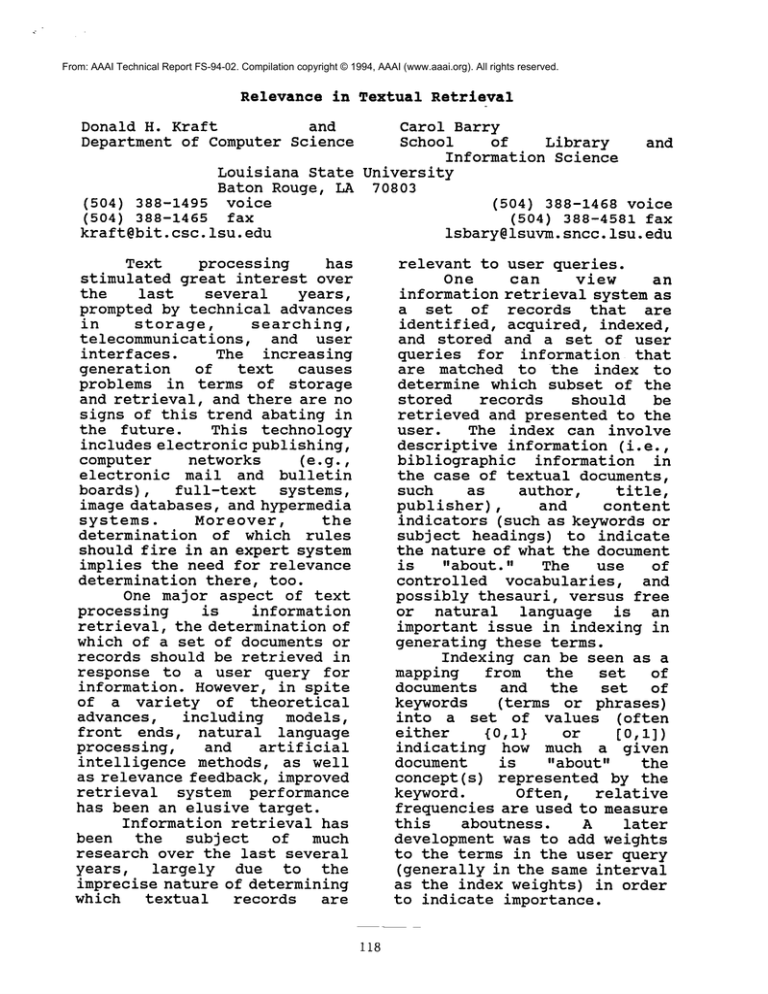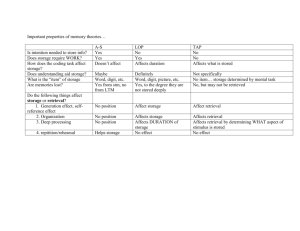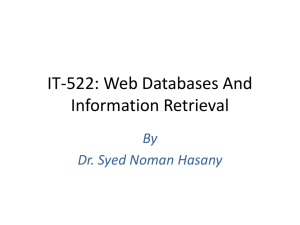
From: AAAI Technical Report FS-94-02. Compilation copyright © 1994, AAAI (www.aaai.org). All rights reserved.
Relevance
in Textual
Retrieval
Carol Barry
School
of
Library
and
Information Science
Louisiana State University
Baton Rouge, LA
70803
(504) 388-1495 voice
(504) 388-1468 voice
(504) 388-1465 fax
(504) 388-4581 fax
kraft@bit.csc.lsu.edu
isbary@isuvm.sncc.lsu.edu
Donald H. Kraft
Department of Computer
and
Science
Text
processing
has
stimulated great interest over
the
last
several
years,
prompted by technical advances
in
storage,
searching,
telecommunications,
and user
interfaces.
The increasing
generation
of text
causes
problems
in terms of storage
and retrieval, and there are no
signs of this trend abating in
the future.
This technology
includes electronic publishing,
computer
networks
(e.g.,
electronic
mail and bulletin
boards),
full-text
systems,
image databases, and hypermedia
systems.
Moreover,
the
determination
of which rules
should fire in an expert system
implies the need for relevance
determination there, too.
One major aspect of text
processing
is
information
retrieval, the determination of
which of a set of documents or
records should be retrieved in
response
to a user query for
information. However, in spite
of a variety
of theoretical
advances,
including models,
front ends, natural
language
processing,
and
artificial
intelligence
methods, as well
as relevance feedback, improved
retrieval
system performance
has been an elusive target.
Information retrieval has
been
the subject
of much
research over the last several
years,
largely
due to the
imprecise nature of determining
which
textual
records
are
relevant to user queries.
One
can
view
an
information retrieval system as
a set of records
that
are
identified, acquired, indexed,
and stored and a set of user
queries
for information
that
are matched
to the index to
determine which subset of the
stored
records
should
be
retrieved and presented to the
user.
The index can involve
descriptive information (i.e.,
bibliographic
information
in
the case of textual documents,
such
as
author,
title,
publisher),
and
content
indicators (such as keywords or
subject headings) to indicate
the nature of what the document
is
"about."
The
use
of
controlled
vocabularies,
and
possibly thesauri, versus free
or natural
language
is an
important issue in indexing in
generating these terms.
Indexing can be seen as a
mapping
from
the
set
of
documents
and
the set of
keywords
(terms or phrases)
into a set of values
(often
either
{0,i}
or
[0,i])
indicating
how much a given
document
is
"about"
the
concept(s) represented
by the
keyword.
Often,
relative
frequencies are used to measure
this
aboutness.
A
later
development was to add weights
to the terms in the user query
(generally in the same interval
as the index weights) in order
to indicate importance.
118
In processing
a query, one
can interpret
the term weights
as points
in a vector
space,
probabilities
of relevance,
or
as
fuzzy
set
membership
functions
in order
to be to
induce
a document
ranking
mechanism.
When Boolean
logic
is
added,
it
introduces
difficulties
in maintaining
the
Boolean
lattice
structure.
Moreover,
there are problems
in
developing
a mathematical
model
of query processing
to evaluate
each record
against
the query
that
will
preserve
the
semantics,
i.e.,
the meaning,
of the user query. For example,
query
weights
can
be
interpreted
as being importance
weights,
thresholds,
or as a
description
of the "perfect"
document.
Despite
these
difficulties,
as well as user
difficulties
in using
it,
Boolean
logic
is at the heart
of most, if not all, commercial
textual
retrieval
systems
(e.g., Dialog, Medline, Lexus).
It has been suggested
that
one enforce
the property
of
separability,
evaluating
a
document
against
each term in
the query
and then
combining
those evaluations
according
to
the Boolean logic of the query.
This
will
preserve
the
isomorphism
between
queries
of
one
term
and
of
Boolean
expressions.
Other
research
has
incorporated
artificial
intelligence
to develop
front
ends
to
aid
in
query
formulation
and search.
These
include using details
about the
users
to better
understand
his/her
information
needs
(e.g.,
an engineer
would
use
the term "stress"
differently
than a psychologist).
In
addition,
expert systems
can be
used to develop
better thesauri
and indexing
methods.
Further,
relevance
feedback
can be incorporated
to
let users
react
to what
has
been
retrieved
and using
the
information
about
which
documents
the
user
deemed
relevant
to modify the query to
improve
the
search.
For
example,
work
is underway
to
employ
genetic
algorithms
to
randomly
search the query space
for the "optimal"
query.
Evaluation
is an issue
that
must
be
mentioned.
Retrieval
system performance
is
often
measured
by its ability
to retrieve
documents
perceived
to be relevant
and
to
not
retrieve
documents
perceived
to
be nonrelevant.
Recall,
the
proportion
of
relevant
documents
retrieved,
and
precision,
the proportion
of
retrieved
documents
that
are
relevant,
are the two central
measures
used.
However,
the
introduction
of weights
permits
ranking
of documents,
so that
these
measures
need
to be
extended
to include
partial
relevance
and rank.
One
aspect
of
system
evaluation
which
has not been
fully
addressed
is
how
relevance
is to be defined
and
who is qualified
to judge
the
relevance
of information.
The
traditional
approach
to
information
retrieval
system
design
and evaluation
has been
a "systems
view" of relevance;
in such
a view,
relevance
is
seen solely
as a property
of
the internal
mechanism
of the
system and relevance
is viewed
as a topical
match between
the
subject
terms
used in queries
and subject
terms
assigned
to
documents
or records.
Within
the systems
view, any qualified
person
can judge the relevance
of
information
by
simply
comparing
the topical
aspects
119
of queries
and documents
or
records.
In recent years, there has
been
increasing
recognition
that
relevance
can
only
be
judged
by the user requesting
the information,
and that this
evaluation
is a cognitive,
dynamic
and subjective
process
which is influenced
by factors
beyond
topical
appropriateness
of information.
Recent research
into user generated
evaluations
of relevance
has
identified
several
nontopical
aspects
of
information
which
influence
users’
evaluations.
These
include
the user’s judgment
of
the recency
of information;
the
extent to which the information
is novel
to the
user;
the
user’s
judgment
of the quality
or validity
of the work;
the
extent to which the information
supports
or contradicts
the
user’s
point
of view;
the
user’s
ability
to understand
the
level
of
discussion
presented;
and so on.
Research
into user defined
relevance
has progressed
to the
point
of identifying
factors
influencing
users’
relevance
evaluations
and supporting
the
view of relevance
as a userbased
judgment
which
incorporates
factors beyond the
topical
appropriateness
of
information.
The next step, it
would
seem,
is to begin
exploration
of the mechanisms
and algorithms
which
might
be
incorporated
into information
retrieval
systems
to carry the
retrieval
process
itself beyond
topical
matching.
120
References
Barry,
C. L., "User-Defined
Relevance
Criteria
:
An
Exploratory
Study,"
Journal
of
the
American
Society
for
Information
Science,
v. 45,
1994, pp.149-159
Bordogna,
G., Carrara,
C.,
and Pasi,
G.,
"Query
Term
Weights as Constraints
in Fuzzy
Information
Retrieval,
"
Information
Processinq
and
Manaqement,
v. i, 1991,
pp.
15-26
Buckles, B. P. and Petry, F.
E. (eds.),
Genetic
Alqorithms,
Washington,
DC: IEEE Computer
Society
Press,
1992
Froelich,
T. J., "Relevance
Reconsidered
-- Toward
an
Agenda
for the 21st
Century:
Introduction
to Special
Topic
Issue
on Relevance
Research,"
Journal
of theAmerican
Society
for Information
Science,
v45,
1994, pp. 124-134
Harter
,
S .
P . ,
"Psychological
Relevance
and
Information
Science,"
Journal
of the American
Society
for
Information
Science,
v. 43,
1992, pp.602-615
Kraft,
D. H., Bordogna,
G.
and
Pasi,
G.,
"An
Extended
Fuzzy
Linguistic
Approach
to
Generalize
Boolean
Information
Retrieval,"
accepted
by Journal
of Information
Sciences,
1994
Kraft,
D. H. and Boyce,
B.
R., "Approaches
to Intelligent
Information
Retrieval,"
in
Delcambre,
L. and Petry,
F. E.
(eds.),
Advances
in Databases
and Artificial
Intelligence,
1994
Kraft,
D. H., "Advances
in
Information
Retrieval:Where
is
That
/#*%@^
Record?,"
in
Yovits,
M. (ed.),
Advances
in
Computers,
v. 24,
Academic
Press,
New
York,
1985,
pp.
277-318
Kraft,
D. H. and Buell,
D.
A., "Fuzzy Sets and Generalized
Boolean
Retrieval
Systems,"
International
Journal
of
Man-Machine
Studies,
v. 19,
1983, pp. 45-56
Kraft,
D. H., Petry, F. E.,
Buckles,
B. P., and Sadasivan,
T.,
"The
Use
of Genetic
Programming
to Build
Queries
for Information
Retrieval,"
IEEE Symposium
on Evolutionary
Computation,
Orlando,
FL, 1994
Miyamoto,
S., Fuzzy Sets in
Information
Retrieval
and
Cluster
Analysis,
Boston,
MA:
Kluwer
Academic
Publishers,
1990
Park, T. K., "The Nature
of
Relevance
in
Information
Retrieval:
An Empirical
Study,"
Library Quarterly,
v. 63, 1993,
pp. 318-351
Salton,
G., Automatic
Text
Processing:
The Transformation,
Analysis,
and
Retrieval
of
Information
by
Computer,
Reading,
MA: Addison-Wesley,
1989
Schamber,
L., Eisenberg,
M.
B.
and Nilan,
M.
S.,
"A
Reexamination
of Relevance:
Toward
a Dyanamic,
Situational
Definition,"
Information
Processing
& Management,
v. 26,
1990, pp. 755-766
121





